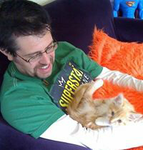GUEST BLOG 2011: A Pretty Good Year
None
Is 2011 a landmark year for Science Fiction? Director of the Arthur C Clarke Award Tom Hunter makes his case
I’m writing this on Sunday 25 September, the last day of Out Of This World: Science Fiction but not as you know it , the British Library’s fantastic summer sci-fi exhibition.
I went back for one last visit around the exhibition yesterday, and am happy to report it was just as packed full of enthusiastic fans, new and old, as it was on opening night when China Miéville did the honours at the opening night party – here’s my shaky phone footage of China’s awesome speech .
I was lucky enough to be invited to work alongside the British Library team promoting the exhibition. Part of this included the Clarke and Kitschies Award organisers teaming up on a fantastic surprise tweet-up with Lauren Beukes (author of this year’s Clarke and Kitschies-winning Zoo City ) and BSFA award-winning cover artist Joey HiFi.
Made possible thanks to Lauren making a heroic 12-hour stopover in the UK while flying from South Africa to America, the event culminated in her speaking with an audience of fans while sat happily on the floor beneath a giant Martian tripod in the centre of the exhibition. It’s the simple things like that that make me happy.
So farewell Out Of This World , but hello Apocalypse , Tate Britain’s new exhibition on 19 th century artist John Martin.
Martin’s epic apocalyptic canvases were hugely popular with the masses but frowned upon by the critical community of the time (a story every science fiction fan should have sympathy with) but his works have endured and gone on to inspire the likes of Ray Harryhausen, Alan Moore and HP Lovecraft and the exhibition artfully revels in this pop cultural popularity by staging Martin’s most famous triptych as a cinematic experience with projections, voiceovers and racked rows of seats so you can sit back and properly enjoy the end of the world.
Get sneak previews, exclusive competitions and details of special events each month!
And if you don’t think the Tate is serious about the science fictional side of the exhibition, do check out their special teaser trailer . And you can hear Ray Harryhausen talking about Martin’s influence on his work here .
These high-profile shows are just two of the highlights in what has been so far, in my humble opinion at least, an incredibly noteworthy year for SF&F.
So what’s made 2011 such a landmark for the genre?
For me at least, I think it’s mostly about breakthroughs. You don’t have to be a fan of science fiction for long to encounter some kind of sniffy attitude or other about our favourite genre, and certainly a lot of work has been done to take the message out there into the world about just how powerful our stuff can be.
Lauren Beukes put it very well when she said that it’s one thing that knowing the mistakes of the past means not being doomed to repeat them, but that it’s equally true that those who don’t imagine the future are doomed to f**k it up!
A manifesto for modern science fiction if ever I heard one.
What interests me in all of the above is that it’s been the big institutions embracing us, not the other way around this time.
This is important, and it’s not over yet. For instance next week the Royal Society will be hosting One Culture , a weekend of science and literature events, and the Southwark Playhouse are staging Howl’s Moving Castle as their alternative to Christmas panto this year.
All of this genre goodness is now happening alongside our regular welcome fixtures like SCI-FI-LONDON and the SFX Weekender which are both going great guns to bring new fans into the genre, and there’s extra doubleplus good news that this autumn will see the debut of not just one but two entirely new dedicated genre imprints: Jo Fletcher Books from Quercus and Berkley UK from Penguin. How awesome is that?
Oh, and speaking of awesome, even the latest news out of CERN that neutrons might be able to go faster than light, or at least cheat by jumping through inter-dimensional pockets in folded space time, has got to be a worth a mention, right?
At the time of writing scientists are pleading with SF writers not to get all excited, but let’s be honest we’ve always known there’s strange new worlds and stranger physics out there and to quote a certain Sir Arthur C Clarke:
“Every revolutionary idea seems to evoke three stages of reaction. They may be summed up by the phrases: 1, It's completely impossible. 2, It's possible, but it's not worth doing. 3, I said it was a good idea all along.”
And everyone said the landmark year for the future of the future was going to be 2001!

Dave is a TV and film journalist who specializes in the science fiction and fantasy genres. He's written books about film posters and post-apocalypses, alongside writing for SFX Magazine for many years.


